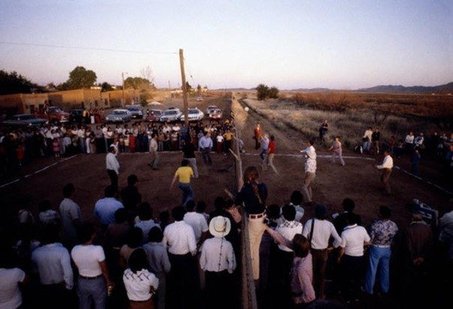The Associated Press has a great story out on what a “secure” US-Mexico border would look like. It covers perspectives from various stakeholders on border security, with opinions running the gamut from “The border is as secure as it can ever be” to “It’s obviously incredibly unsafe.” I am not sure if the AP is fairly representing opinions on the border issue, but the reporting of how life on the border has evolved over time is fascinating.
One thing that strikes me in this reporting is how casually drug smugglers/slave traffickers and good-faith immigrants are easily-conflated. Is a secure border one where people who want to move contraband goods or human slaves illegally cannot easily enter? Or is it one where well-meaning people can be indefinitely kept at bay for an arbitrary accident of birth? This passage juxtaposes the two quite different situations:
And nearly all of more than 70 drug smuggling tunnels found along the border since October 2008 have been discovered in the clay-like soil of San Diego and Tijuana, some complete with hydraulic lifts and rail cars. They’ve produced some of the largest marijuana seizures in U.S. history.
Still, few attempt to cross what was once the nation’s busiest corridor for illegal immigration. As he waited for breakfast at a Tijuana migrant shelter, Jose de Jesus Scott nodded toward a roommate who did. He was caught within seconds and badly injured his legs jumping the fence.
Scott, who crossed the border with relative ease until 2006, said he and a cousin tried a three-day mountain trek to San Diego in January and were caught twice. Scott, 31, was tempted to return to his wife and two young daughters near Guadalajara. But, with deep roots in suburban Los Angeles and cooking jobs that pay up to $1,200 a week, he will likely try the same route a third time.
The main thing that strikes me about the previously “unsecure” border near San Diego is that border patrol agents were overwhelmed by a mass of people until more staff and walls were brought to bear. But these masses of people almost certainly were comprised in large part, if not near-entirely, of good-faith immigrants. Smugglers and traffickers merely take advantage of the confusion to sneak in with the immigrants. If the immigrants had a legal path to entry, if they did not have to cross the border unlawfully, the traffickers would be naked without human crowds to hide in. If border security advocates just want to reduce illegal trafficking, demanding “border security” before loosening immigration controls may well be putting the cart before the horse.
Even so, as I’ve said before, the physical reality of a long border means that human movement across it can never be fully controlled. Demanding totalitarian control as “true border security” is about as unrealistic as, if not even more so than an open borders advocate demanding the abolition of the nation-state.
The AP covers some damning stories of peaceful Americans murdered by drug traffickers in the same breath as it covers someone trying to get to a job in suburban LA. Even if one insists that murdering smugglers and restaurant cooks should be treated identically on account of being born Mexican, it is difficult to see how one can demand that the US border patrol prioritise detaining them both equally. Yet as long as US visa policy makes it near-impossible for most good-faith Mexicans who can find work in the US to do so, the reality of the border means that thousands of Mexicans just looking to work will risk their lives crossing the border, alongside smugglers and murderers.
The more reasonable policy has to be one that will allow US border patrol to focus on catching the most egregious criminals. That means giving the good-faith immigrants a legal channel to enter the US on a reasonable timeframe, reducing the flow of unlawful border crossings. This is not just my opinion, but that of even a former (Republican) US Ambassador to Mexico (emphasis added):
Tony Garza remembers watching the flow of pedestrian traffic between Brownsville and Matamoros from his father’s filling station just steps from the international bridge. He recalls migrant workers crossing the fairway on the 11th hole of a golf course – northbound in the morning, southbound in the afternoon. And during an annual celebration between the sister cities, no one was asked for their papers at the bridge. People were just expected to go home.
Garza, a Republican who served as the U.S. ambassador to Mexico from 2002 to 2009, said it’s easy to become nostalgic for those times, but he reminds himself that he grew up in a border town of fewer than 50,000 people that has grown into a city of more than 200,000.
The border here is more secure for the massive investment in recent years but feels less safe because the crime has changed, he said. Some of that has to do with transnational criminal organizations in Mexico and some of it is just the crime of a larger city.
Reform, he said, “would allow you to focus your resources on those activities that truly make the border less safe today.”
It’s the view of those sheriffs who places themselves in harm’s way to fight those murderers and smugglers (emphasis added):
Hidalgo County Sheriff Lupe Trevino points out that drug, gun and human smuggling is nothing new to the border. The difference is the attention that the drug-related violence in Mexico has drawn to the region in recent years.
He insists his county, which includes McAllen, is safe. The crime rate is falling, and illegal immigrants account for small numbers in his jail. But asked if the border is “secure,” Trevino doesn’t hesitate. “Absolutely not.”
“When you’re busting human trafficking stash houses with 60 to 100 people that are stashed in a two, three-bedroom home for weeks at a time, how can you say you’ve secured the border?” he said.
Trevino’s view, however, is that those people might not be there if they had a legal path to work in the U.S.
“Immigration reform is the first thing we have to accomplish before we can say that we have secured the border,” he said.
…
In Nogales, Sheriff Tony Estrada has a unique perspective on both border security and more comprehensive immigration reform. Born in Nogales, Mexico, Estrada grew up in Nogales, Ariz., after migrating to the U.S. with his parents. He has served as a lawman in the community since 1966.
He blames border security issues not only on the cartels but on the American demand for drugs. Until that wanes, he said, nothing will change. And securing the border, he added, must be a constant, ever-changing effort that blends security and political support – because the effort will never end.
“The drugs are going to keep coming. The people are going to keep coming. The only thing you can do is contain it as much as possible.
“I say the border is as safe and secure as it can be, but I think people are asking for us to seal the border, and that’s unrealistic,” he said.
Asked why, he said simply: “That’s the nature of the border.”
Simply put, if you want a secure US-Mexico border, one where law enforcement can focus on rooting out murderers and smugglers, you need open borders. You need a visa regime that lets those looking to feed their families and looking for a better life to enter legally, with a minimum of muss and fuss. When only those who cross the border unlawfully are those who have no good business being in the US, then you can have a secure border.
The image featured in the header of this post depicts the Puente Viejo bridge connecting Brownsville, Texas and Matamoros, Tamaulipas. Via the University of Texas at Brownsville.


